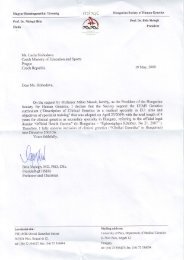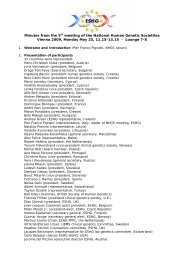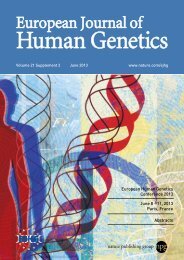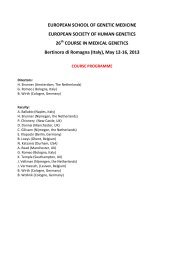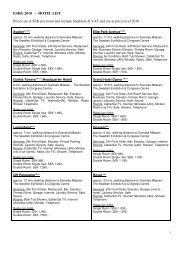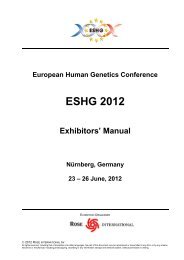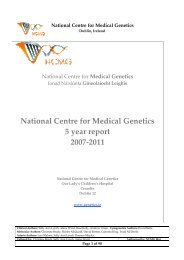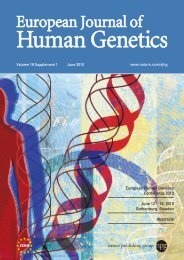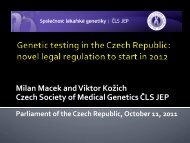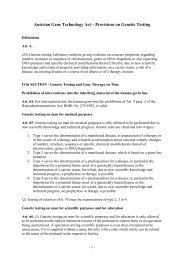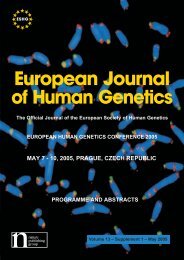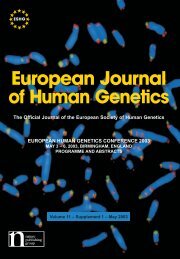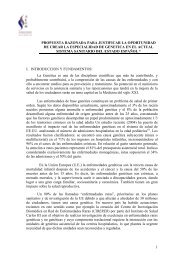2008 Barcelona - European Society of Human Genetics
2008 Barcelona - European Society of Human Genetics
2008 Barcelona - European Society of Human Genetics
You also want an ePaper? Increase the reach of your titles
YUMPU automatically turns print PDFs into web optimized ePapers that Google loves.
Genetic counselling, education, genetic services, and public policy<br />
us to analyse performance <strong>of</strong> a laboratory more specifically and to<br />
survey if individual comments, provided by the assessors, were taken<br />
into account by the laboratory .<br />
Regular participation contributes to continuous improvement and monitoring<br />
<strong>of</strong> internal quality in laboratory performance . Moreover, it is a<br />
relevant tool for assessors to educate laboratories .<br />
P09.21<br />
Fetal alcohol syndrome among grade-one children in the<br />
Northern cape Province <strong>of</strong> south Africa: prevalence and risk<br />
factors<br />
M. F. Urban 1 , M. F. Chersich 2 , L. Fourie 3 , C. Chetty 3 , L. Olivier 4 , J. Rosenthal 5 ,<br />
D. L. Viljoen 4 ;<br />
1 University <strong>of</strong> Cape Town, Cape Town, South Africa, 2 International Centre for<br />
Reproductive Health, Kenya and University <strong>of</strong> Ghent, Ghent, Belgium, 3 Foundation<br />
for Alcohol Related Research, Johannesburg, South Africa, 4 Foundation<br />
for Alcohol Related Research, Cape Town, South Africa, 5 Centers for Disease<br />
Control, Atlanta, GA, United States.<br />
Objective: To describe prevalence, characteristics and risk factors for<br />
fetal alcohol syndrome (FAS) and partial FAS among children attending<br />
grade one in the Northern Cape Province <strong>of</strong> South Africa .<br />
Design: Cross-sectional study using a two-tiered method for active ascertainment<br />
<strong>of</strong> FAS/partial FAS cases . This comprised screening <strong>of</strong><br />
growth parameters, and then diagnostic assessment for screen-positive<br />
children using clinical and neuro-cognitive assessments, and maternal<br />
history <strong>of</strong> drinking during pregnancy . Mothers or care-givers <strong>of</strong><br />
children with FAS were interviewed, as well as matched controls .<br />
Setting: Primary schools in De Aar (8) and Upington (15) .<br />
Subjects: Grade one pupils in 2001 (De Aar, n=536) and 2002 (Upington,<br />
n=1299) .<br />
Outcome measures: FAS or partial FAS .<br />
Results: Prevalence <strong>of</strong> FAS/partial FAS was high: 64/536 (119 .4/1000,<br />
95% CI=93 .2-149 .9) in De Aar, and 97/1299 (74 .7/1000, 95% CI=61 .0-<br />
90 .3) in Upington . Overall, 67 .2 per 1000 children (95% CI=56 .2-79 .7)<br />
had full FAS features . Growth retardation was also common in this<br />
population: 66 .6% (1181/1774) were underweight, 48 .3% (858/1776)<br />
stunted and 15 .1% had a head circumference 75% <strong>of</strong> questions<br />
correctly, but there were misunderstandings about the risk or implications<br />
<strong>of</strong> carrier status. There was a significant difference in knowledge<br />
between ethnicities . Adult patients with galactosemia had more misunderstandings<br />
in relation to inheritance, recurrence risks and carrier<br />
status than their parents . 83% <strong>of</strong> study participants requested more<br />
information about their condition and its transmission . 40% <strong>of</strong> affected<br />
adults with galactosemia identified a need to meet others with the<br />
same condition . While parents <strong>of</strong> children with MSUD or galactosemia<br />
are well informed, the majority expressed a wish for more information .<br />
Adult patients themselves and parents from an Irish Travelling back-<br />
ground could especially benefit from further genetic counselling.<br />
P09.23<br />
molecular testing for rare genetic disorders in Europe: hype or<br />
hope?<br />
P. J. Willems;<br />
GENDIA (GENetic DIAgnostic network), Antwerp, Belgium.<br />
Currently, there are huge differences between various countries in accessibility,<br />
price and quality <strong>of</strong> molecular diagnostic testing . The bottlenecks<br />
include the vast number <strong>of</strong> genetic diseases (> 1000), the low<br />
number <strong>of</strong> samples per disease, the nature <strong>of</strong> the disease mutation<br />
<strong>of</strong>ten being a private mutation, the high cost <strong>of</strong> testing and lack <strong>of</strong> reimbursement<br />
by governments and insurance companies, and the lack <strong>of</strong><br />
an international organised network <strong>of</strong> diagnostic labs combining their<br />
portfolio <strong>of</strong> tests . All these bottlenecks impair a cost-effective and reliable<br />
diagnostic service, thereby holding molecular testing in many<br />
countries in a preclinical era . However, the quality, accessibility and<br />
cost-effectiveness <strong>of</strong> diagnostic tests for rare genetic disorders could<br />
be substantially improved by the creation <strong>of</strong> an international network<br />
<strong>of</strong> diagnostic labs combining their portfolio <strong>of</strong> tests and exchanging<br />
samples for rare genetic disorders. The first network <strong>of</strong> diagnostic labs<br />
<strong>of</strong>fering genetic tests internationally was incorporated four years ago,<br />
and is called GENDIA (for GENetic DIAgnostic Network) . It consists <strong>of</strong><br />
“referral labs” sending samples to GENDIA, “test labs” testing samples<br />
they receive from GENDIA, and a central GENDIA lab coordinating the<br />
network . Currently more than 2 .000 different genetic tests are available<br />
through GENDIA . Such international network <strong>of</strong> genetic diagnostic<br />
labs results in greater access to a large spectrum <strong>of</strong> genetic tests<br />
performed with higher quality at lower cost .<br />
P09.24<br />
What is the impact <strong>of</strong> genetic counseling and prenatal diagnosis<br />
in genetic diseases prevention in an Arab muslim population?<br />
H. Chaabouni-Bouhamed1 , L. Kraoua1 , M. Chaabouni1 , M. Kharrat2 , L. Ben<br />
Jemaa1 , R. Mrad1 , F. Maazoul1 ;<br />
1 2 Department <strong>of</strong> Hereditary Disorders, Tunis, Tunisia, Department <strong>of</strong> <strong>Human</strong><br />
<strong>Genetics</strong>, Tunis, Tunisia.<br />
Tunisians are mostly <strong>of</strong> Arab and Berber origin, and nearly all are Muslim<br />
. Consanguineous marriages are prevalent . Tunisia is different from<br />
its neighbouring countries in its accomplishments towards women’s<br />
rights . The nuptial evolution toward a belated marriage model reduced<br />
the progeny . Contraception is encouraged and abortion is legal in case<br />
<strong>of</strong> medical or acute social problem . Genetic disorders are common in<br />
Tunisia; more than 70% <strong>of</strong> the population are educated and most are<br />
receptive to health guidelines . Genetic counselling (GC) and prenatal<br />
diagnosis (PND) are performed as medical facilities in a limited number<br />
<strong>of</strong> genetic centres . To evaluate the real impact <strong>of</strong> GC and PND<br />
on genetic diseases prevention, we surveyed during three years 2862<br />
couples /families who were referred to our center . We evaluated the<br />
impact <strong>of</strong> GC on parents’ attitude by analyzing the occurrence <strong>of</strong> pregnancies<br />
and the acceptance <strong>of</strong> prenatal screening and PND . Parameters<br />
were correlated to parents’ age, socioeconomic situation, and<br />
education level; and to the disease . Our results showed that people in<br />
Tunisia ask for GC and follow it in most cases . The response quality<br />
is variable depending on the patients’ education and their socio-economic<br />
class . This is in some ways different from other Arab countries<br />
with similar cultural and religious backgrounds, probably due to social<br />
and legislative differences . At present, GC and PND seems to be the<br />
method <strong>of</strong> choice for prevention <strong>of</strong> genetic diseases in Tunisia and<br />
such services should be developed as a priority despite the financial<br />
costs <strong>of</strong> such a programme . .<br />
P09.25<br />
Exploring the views <strong>of</strong> <strong>European</strong> clinical genetic pr<strong>of</strong>essionals<br />
on new international recommendations for genetic counselling<br />
related to genetic testing<br />
R. A. Pest<strong>of</strong>f 1 , H. Kääriäinen 2 , E. Rantanen 3 , M. Hietala 3 , L. Kerzin-Storrar 1 ;<br />
1 Medical <strong>Genetics</strong> Research Group and Regional <strong>Genetics</strong> Service, CMMC and<br />
University <strong>of</strong> Manchester, Manchester, United Kingdom, 2 Institute <strong>of</strong> Biomedicine<br />
- Department <strong>of</strong> Medical <strong>Genetics</strong>, Turku, Finland, 3 Department <strong>of</strong> Medical<br />
<strong>Genetics</strong>, Turku, Finland.<br />
EuroGentest: The main goal <strong>of</strong> the EuroGentest Network <strong>of</strong> Excellence<br />
is to improve and harmonise the quality <strong>of</strong> genetic testing in Europe .



